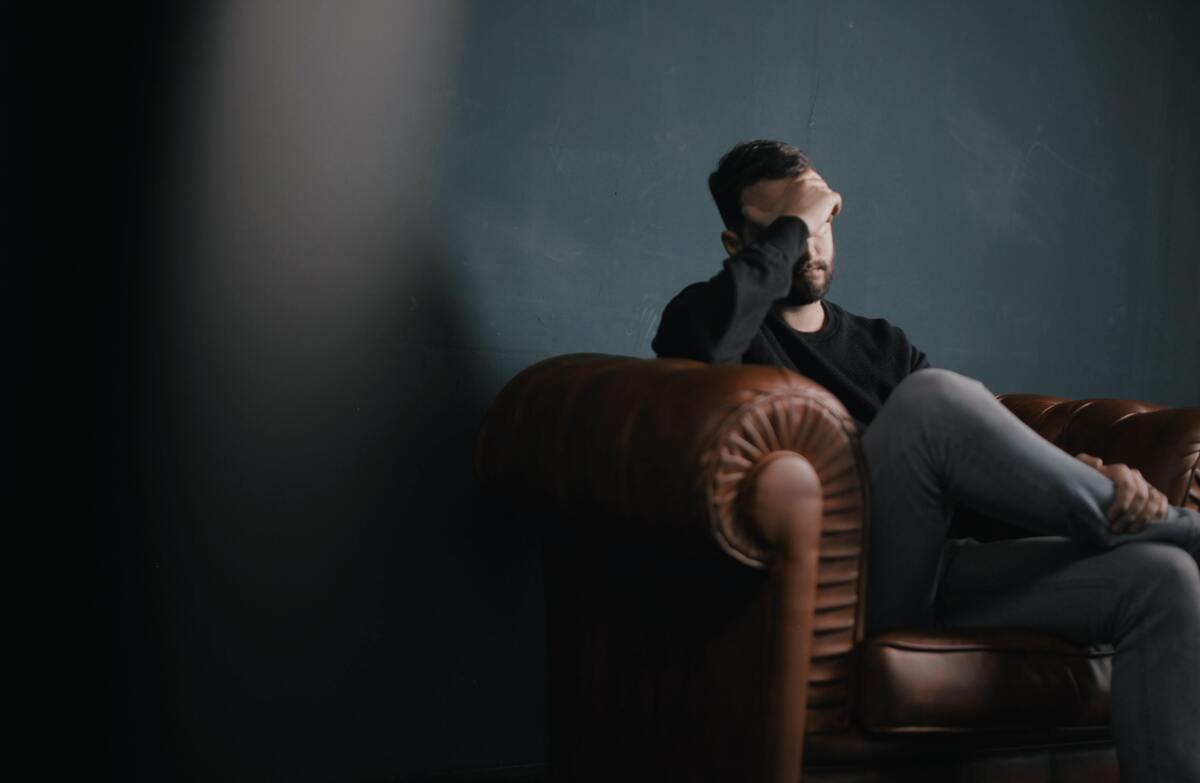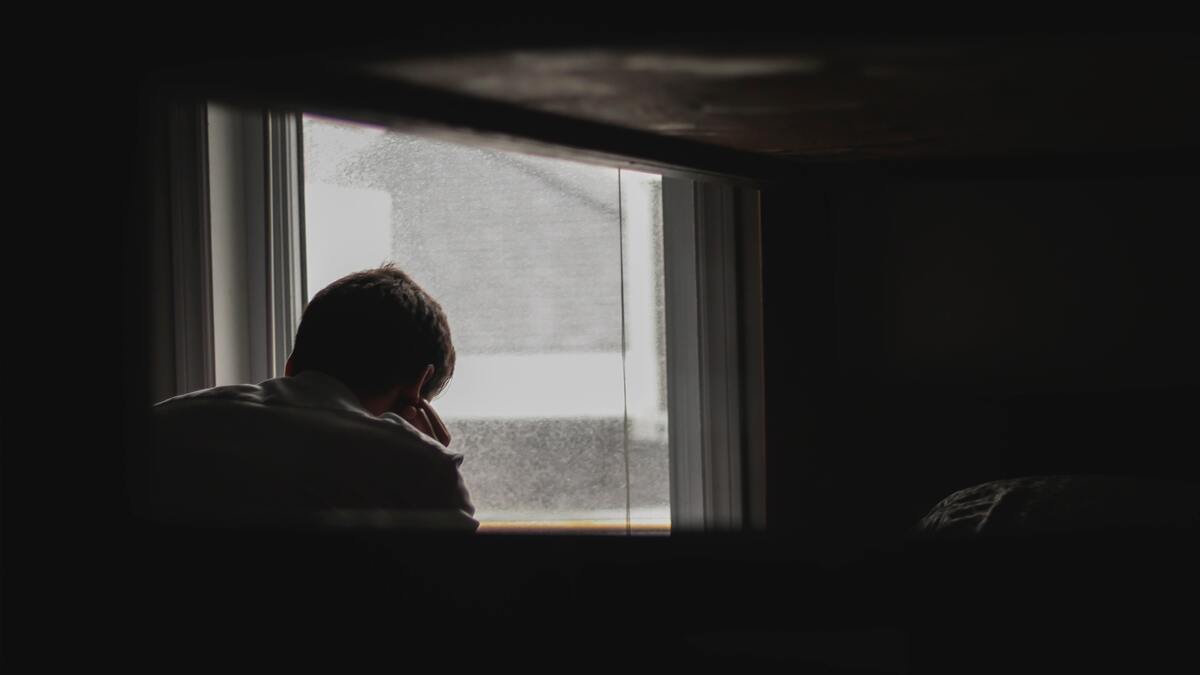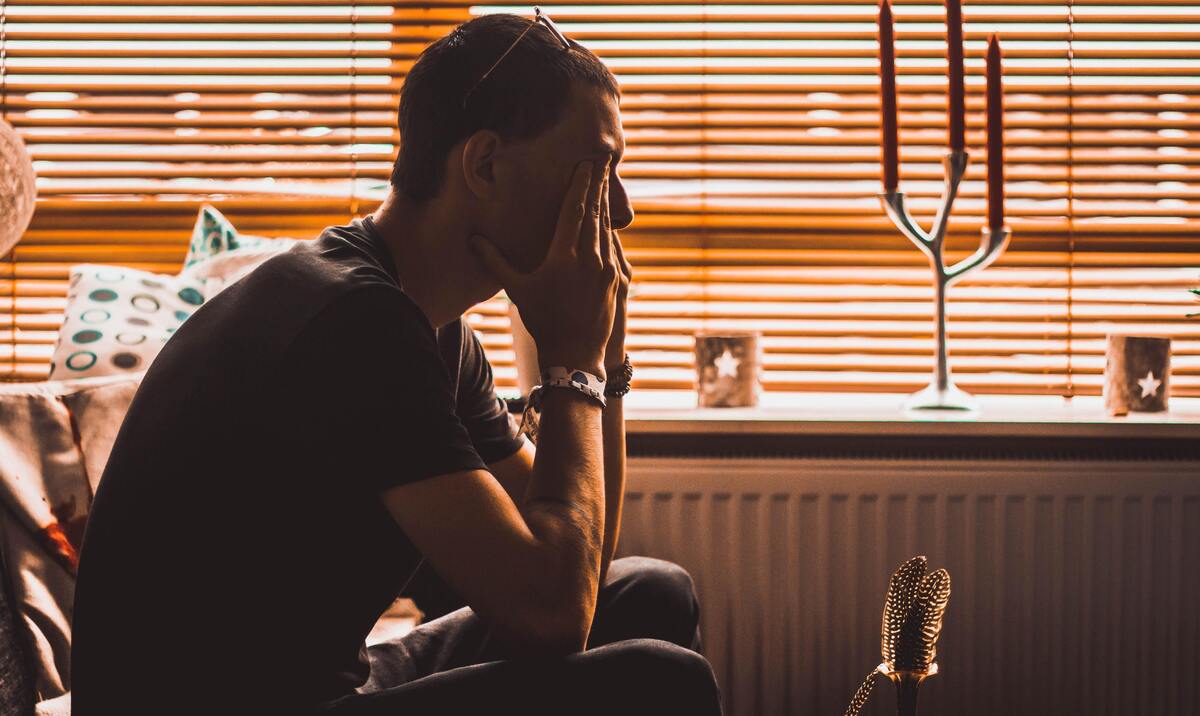Table of contents
What is anxiety?

Anxiety is a natural reaction of the body when we experience challenging situations, such as speaking in public, attending a job interview, taking a test and other important events. However, for some, anxiety is very intense and constant, which may signal the beginning of an illness.
It is worth remembering that this is one of the diseases that most impairs the quality of life in the world, so you are not alone. Therefore, it is important to keep an eye on the symptoms and frequency, since it is not always easy to identify this disorder. Read on and find out what are the signs that the situation is exceeding the limits.
About anxiety

The anxiety disorder differs from a natural feeling because it is excessive and persistent. In addition, it greatly disrupts the patient's life, since it is usually accompanied by other ailments. Check it out below.
Anxiety attack
An anxiety attack occurs when there is an increase in the intensity of the manifestations of this illness. Some of the typical symptoms are racing heart, rapid and wheezing breathing, and feeling that something terrible might happen.
The individual can still experience:
- Shiver;
- Dry mouth;
- Dizziness;
- Restlessness;
- Anguish;
- Overworrying;
- Fear;
- Tingling, especially in the arms and neck;
- Feeling like you're going to pass out at any moment.
During a crisis, it is very common for a person to believe that he or she is dying, so they often seek the nearest emergency room. However, upon examination, the doctor can confirm that it is an episode of the anxiety disorder.
Anxiety and depression
The association between anxiety and depression is frequent, as the diseases usually go hand in hand. However, the disorders themselves are different, as they have distinct symptoms, causes and treatments.
However, it is worth keeping an eye out, because there is the possibility of anxiety and depression manifesting at the same time, and they may even get confused. With this, a kind of mixed disorder is configured, with alternation between anxious and depressive symptoms.
Anxiety and stress
It can be said that anxiety and stress are closely linked. After all, excess stress is one of the biggest risk factors for the development of anxiety attacks. Lifestyle can influence a lot.
For example, an exhausting job with too many demands and no time to relax is the perfect combination to trigger disorders. Then, the fear of experiencing a bad situation leads to stress, which, in turn, leads to anxiety. This becomes an endless and highly harmful cycle.
Types of anxiety

Anxiety can be divided into several categories, according to its manifestations, causes and frequency of crises. However, there are 5 main types, because they are more common. Find out below.
Generalized anxiety disorder
Generalized anxiety disorder (also known as GAD) is one of the most common psychological disorders in the world. It is characterized by episodes of recurrent stress and excessive worry, directly interfering in the individual's daily life.
The symptoms of this disease can vary, but often involve:
- Muscle tension;
- Heart racing;
- Fatigue;
- Sudoresis (excessive sweating);
- Headache;
- Gastrointestinal problems;
- Insomnia;
- Irritability;
- Restlessness;
- Difficulty concentrating;
- Memory loss.
In addition, the disorder is usually triggered by the fear that something bad will happen to loved ones, or the dread of not being able to pay the bills. It is very common for the focus of worry to change over the course of anxiety attacks.
Panic disorder
Panic disorder, or panic syndrome, as it is popularly known, is linked to anxiety. This illness presents unexpected crises of fear, despair and insecurity, even when there is no apparent risk.
In this way, the individual feels that he/she is losing control and will die at any moment. Therefore, daily activities are impaired, since there is always the concern that a new episode will happen.
By the way, the quality of sleep of those who suffer from panic syndrome is also affected, because the crises can take over even while the person is sleeping.
Social phobia
Social phobia, also known as social anxiety, is very common and always happens when the individual is in public. It is a type of disorder that causes people to suffer with anticipation, just by imagining that others are judging you or watching you closely.
People with social phobia worry too much about the opinion of others, so they wonder how their actions will be interpreted. They usually imagine the worst possible scenarios and try to avoid them at all costs.
In a public speech, for example, the person believes they will turn red, sweat profusely, vomit, stutter, and shake a lot. Another frequent fear is not being able to find the right words and making a fool of themselves. Thus, they end up isolating themselves to avoid any high-profile situation.
Obsessive-compulsive disorder
The obsessive-compulsive disorder, better known as OCD, is a disorder marked by obsessive and repetitive movements. This person suffers with the fear of losing control, since he/she feels guilty if something bad happens, even in situations known to be uncontrollable, like a tragedy.
It is worth remembering that the individual with OCD is unable to control negative and obsessive thoughts. Therefore, he ends up doing repetitive acts, in a desperate attempt to eliminate the bad feelings. These "rituals" happen several times a day, in a systematic way, greatly harming the quality of life as a whole. For these people, not fulfilling the rituals implies terrible consequences.
Post-traumatic stress disorder
Post-traumatic stress disorder (known by the acronym PTSD) is caused by a traumatic event. This happens because some memories are so intense that they start to torment the individual, kicking off the development of a disorder.
The individual usually goes into crisis when faced with a trigger, which can be a situation similar to the trauma, a smell or even a song. With the triggers, he/she remembers the feelings experienced during the trauma and relives the whole occurrence.
Unfortunately, we are subjected to trauma every day, through bullying at school, a car accident, or a violent act such as a robbery or rape.
Causes of anxiety

The causes of anxiety can vary greatly from person to person, since each person has a unique life experience. However, there are some factors that can even facilitate the emergence of this disorder. Check out below.
Specific genes
One of the risk factors for the development of anxiety disorder is in genetics. There are some specific genes that are associated with this disorder and can be passed through several generations, presenting an infinite cycle in the family tree.
It can be said that the genetic influence of the anxiety disorder corresponds to approximately 40% of cases. Therefore, it is possible to state that if a first-degree relative presented this disorder, unfortunately there is a great chance that you are also affected.
It is also important to remember that in some people, anxiety is completely determined by genetics.
Environmental factors
Environmental factors greatly influence the development of any type of anxiety disorder. A stressful workplace and an overly hectic routine are among the most common triggers for mental illness.
In addition, the chances of this disorder starting in childhood are high, because it is at school that we have the first contact with tests and bullying can happen. This causes a child's stress levels to increase significantly.
Thus, traumas experienced during childhood lead to a great impact on adult life. This is because the anxiety disorder is not something that arises overnight, but a medium and even long-term process.
Personality
Personality can be a determining factor in triggering anxiety disorder. Some people, unfortunately, are born with traits that increase the risk of suffering from mind-related illnesses.
Generally, they are introverted, inhibited and shy individuals, with low self-esteem. In addition, they are easily hurt by criticism and are also very sensitive to rejection.
Thus, they tend to feel uncomfortable and anxious in social events, for being out of their comfort zone, escaping from routine. In situations of social prominence, they become tense, apprehensive and even scared, reaching very high levels of stress.
Gender
To get an idea of the scope of the anxiety disorder, 2015 data from the WHO (World Health Organization) show that approximately 3% of the world population suffers from some type of this pathology.
A curious fact about anxiety disorder is that it seems to "prefer" women. Gender matters a lot when it comes to this mental disorder, since women are approximately twice as likely to develop the disease. The explanation lies in hormones.
In the Americas alone, for example, more than 7% of women have been properly diagnosed with this mental disorder, while the percentage among men is about half: 3.6%.
Trauma
Trauma, that is, an event that brings high negative emotional impact, is one of the risk factors and is among the main causes of anxiety disorder. Going through a terrible situation causes the individual to constantly present invasive and disturbing thoughts. In addition, flashbacks and terrifying nightmares are also common, which greatly impair quality of life.
In Brazil, urban violence is closely linked to trauma. Traumatic situations such as discrimination, torture, assault, kidnapping, robbery and sexual abuse often become triggers for this disorder.
Symptoms of anxiety

The symptoms of anxiety disorder can manifest physically, emotionally, or a combination of the two. Read on and find out how to identify some traits of the disorder below.
Danger in everything
One of the most common symptoms of those who suffer from anxiety disorder is always imagine the worst possible scenario in any situation. This happens because these people overestimate the risk and danger, having these feelings in an excessive way, totally out of proportion.
You have probably met someone who is afraid to travel by plane because they believe they will be the victim of a terrible plane crash. Another episode happens when the patient goes to the doctor, elaborating thousands of theories that he has a very serious illness and his days are numbered.
Dysregulated appetite
Anxiety disorder greatly affects a person's appetite, which becomes completely unregulated. For some, hunger simply disappears, causing the individual to lose too much weight, which leaves them weak, debilitated, and susceptible to other diseases.
For others, the desire to eat increases significantly during stressful moments, so when the person gets worried, he or she rushes to indulge in several sweets to reduce stress. The problem is that these individuals chew little, which facilitates the exaggerated intake of food in a few minutes. So, it is worth taking care not to develop eating disorders.
Sleep dysfunction
The anxiety disorder causes sleep dysfunction and, in this case, the individuals who suffer from this disease find it very difficult to sleep, presenting frequent bouts of insomnia. These episodes occur mainly before an important event, such as a work meeting or a school test.
They are unable to relax and disconnect from the events of the day, spending the whole night in the clear, planning what should be done the next morning. Sometimes anxiety disorder causes people to dream about some problem and wake up thinking about possible solutions to the issue at hand.
Muscle tension
One of the most common physical symptoms of anxiety disorder is constant muscle tension. This disorder usually leaves muscles tensed and ready to react to any risk or threat. In this case, the greater the worry and stress, the greater the tension, especially in the cervical region. Thus, back, shoulder and neck pain are frequent and can be verystrong.
In some patients, the muscle tension is so great that it is practically impossible to turn one's head to the side. The pain is enormous and can become incapacitating; therefore, special care must be taken not to consume muscle relaxants excessively.
Dread of public speaking
One of the main emotional symptoms of anxiety disorder is the dread of public speaking. For many people, imagining the need to make a presentation in front of an audience is synonymous with stress and panic.
In these situations, the individual becomes extremely nervous, starts to sweat a lot, feels the heart beating faster and stronger, has cold hands and presents gasping for breath, with shortness of breath at various times.
This feeling of fear is usually associated with the dread of being humiliated and the fear of being judged for one's actions.
Excessive worry
Excessive worry is one of the best known symptoms of anxiety disorder, since these people are constantly restless, thinking about the future. This worry, by the way, is the main cause of ulcers, gastritis, stress and headaches in anxious patients.
It is necessary to be alert, because all this can also affect the immune system. Besides, the anguish and mental storm that these individuals live with makes it very difficult for them to concentrate, because millions of things are going through their head, it is impossible to focus.
Thus, the efficiency of these people is extremely affected, which increases worry. Thus, life becomes an endless cycle of despair and distress.
Approaching nervous breakdowns
Those who suffer from anxiety disorder tend to strike a fine line between reason and emotion quite often, especially when they are close to having a nervous breakdown. These individuals experience mood swings from one hour to the next and become quite irritated, seemingly without a logical explanation.
The episodes that lead to a nervous breakdown usually arise in stressful situations, when there is a lot of pressure. When a person is close to a nervous breakdown, the mind has already been extremely damaged, which causes some rules and boundaries to be exceeded.
Irrational fears
Irrational fears are among the most damaging symptoms of anxiety disorder. In this condition, people anticipate a future threat that may not even actually happen.
Thus, many individuals are terrified of failure, of being alone or rejected. With this, they end up missing several opportunities and cannot accept moments of doubt or uncertainty, because they are usually dominated by negative thoughts.
At work, by the way, they are champions of self-criticism, because they believe they are not capable or good enough to take on a project. Therefore, it can be said that these fears and insecurities compromise the development of a career, which could be one of enormous success.
Constant restlessness
Restlessness, that is, the difficulty to sit still or rest your mind, is a symptom that can appear in anxiety disorders. However, it is worth noting that not all patients experience this feeling.
But when it comes to children and adolescents, constant restlessness accompanied by excessive gesticulation is a strong indication of the disease. When these individuals become restless, they lose the ability to concentrate and feel deeply distressed.
By the way, this is a symptom that can disturb the quality of life not only of the person, but also of those around them, who end up worrying about the anguish that the loved one is feeling.
Obsessive thoughts
Obsessive thoughts are part of the most destructive and harmful symptoms of anxiety disorder. In this mental state, it is impossible to control the thoughts, which appear in a recurrent and distressing way.
Some studies show that these repetitive cycles of ideas and images in the brain are linked to a neurological dysfunction, with a cause still unknown to the scientific community.
This manifestation of anxiety is an important sign and is present in several types of the disorder, as in GAD (generalized anxiety disorder), OCD (obsessive-compulsive disorder), panic syndrome, among others.
Perfectionism
Excessive perfectionism is an important symptom to identify a possible anxiety disorder. It is characterized by exaggerated preciousness, with the establishment of very high standards and the search for something perfect in all life situations.
For this reason, some individuals usually procrastinate in a conscious way, seeking to self-sabotage to avoid a project that will not be perfect. It cannot be denied that perfectionists have an enviable performance, however, the price charged for success can be very high.
It is worth noting that perfection is practically impossible to achieve and the consequences of this search lead straight to anxiety. One must be very careful so that this characteristic does not bring a path of unhappiness, dissatisfaction and excessive fear of failure.
Digestive problems
The digestive system is one of the most affected by anxiety disorder, since symptoms such as pain, heartburn, poor digestion and diarrhea are exceptionally frequent in patients suffering from this disorder.
When a person goes through a very stressful situation, with excessive anxiety, gastrointestinal functions are altered because of the action of the nervous system. That is, the reflections are not only in the mind, but in the body as a whole.
Therefore, bouts of gastritis, ulcers, gastroesophageal reflux, irritable bowel syndrome and other inflammatory diseases linked to digestion are a consequence of high levels of anxiety.
Physical symptoms
The anxiety disorder causes several emotional manifestations, but also interferes with the functioning of the body as a whole. During crises, some physical symptoms may arise. Check them out:
- Muscular pain, usually in the cervical region;
- Tiredness or fatigue;
- Dizziness;
- Tremors;
- Shortness of breath or rapid, wheezing breathing;
- Racing heart, feeling of arrhythmia;
- Sudoresis (excessive sweating);
- Dry mouth;
- Nausea;
- Diarrhea;
- Abdominal pain or discomfort;
- Sensation of choking;
- Difficulty swallowing food;
- Chills or heat waves;
- Very cold and sweaty hands;
- Overactivity of the bladder (constant need to urinate).
How to avoid anxiety

Avoid and control anxiety alone is a challenge, but some tactics and changes in everyday life help you to mitigate this feeling that can be so harmful. Check out some tips to put into practice today.
Going to bed early
The first tip is to go to bed earlier, since sleep deprivation is a risk factor for the development of anxiety disorder. A poor quality of sleep amplifies the brain's anticipatory reactions, raising stress levels.
Sleeping well helps the mind to relax. So, create a kind of healthy bedtime routine: stop using the phone 1 hour before and gradually slow down the pace, signaling to the body that it's time to rest.
Use music to relax
Music is a great ally to relax and combat anxiety. Songs are present in various moments, since they help us to extravasate, dance, celebrate and even rest after an intense day.
It can be said that music is therapeutic because it works almost as well as a medicine and has no contraindications. It is impossible not to be happier or to go out singing when listening to your favorite music.
By the way, studies show that listening to music decreases anxiety levels by 65%. Songs are able to release a series of neurotransmitters linked to pleasure, such as dopamine, which brings the feeling of reward. In other words, use music without moderation.
Wake up 15 minutes earlier
Waking up 15 minutes earlier is a highly recommended practice for anxious people, as it allows these individuals to slow down a bit. This way, they can take a relaxing shower and get ready for a more productive day without constantly feeling behind.
When the person starts the day calmly, slowing down, the rest of the day becomes less stressful and, consequently, happier. This happens because the to-do list can be done smoothly and efficiently, because there is plenty of time.
Reduce caffeine, sugar and processed foods
Reducing your intake of coffee, sugar and processed foods helps ease the symptoms of anxiety disorder and maintain brain health. This is because caffeine and fluctuating blood sugar levels can cause heart palpitations, which can be worrisome for an anxious person.
It can be said that a healthy brain is essential to combat anxiety. Everything we ingest is reflected in the body and mind, so a balanced diet is essential for controlling the disease.
Do physical activities
Doing regular physical activity helps to increase the feeling of well-being, also increasing mood and productivity. Exercises also help to combat insomnia, alleviating the symptoms of anxiety disorder.
In the short and medium term, physical exercises regulate sleep, since the practice releases endorphins, a natural hormone that provides a very pleasurable feeling. With this, there is a significant improvement in mental health.
Getting your body moving and having sports as a hobby contribute greatly to a less anxious and more enjoyable journey.
Don't cover yourself so much
It's very hard for an anxious person to stop charging themselves so much, but it's necessary. It's worth remembering that negative feelings attract equally negative thoughts, turning into a very damaging cycle.
So, don't be so demanding, since self-criticism only makes anxiety attacks increase. Perfectionism is your biggest enemy in this situation. Start being kinder to yourself, doing the tasks in your own time, without haste and, above all, without pressure.
Seek help
As soon as you notice any symptoms of the anxiety disorder, seek a qualified professional, such as a psychologist or psychiatrist. He or she will help you identify patterns of harmful behavior and thinking, promoting self-awareness and freeing your mind.
One of the possible treatments is psychotherapy, based on dialogue. In it, the psychologist creates a neutral supportive environment where the patient can openly talk about all the afflictions he or she is going through, without fear of being judged.
Remember that consulting a specialist is not a reason for shame, but a reason for pride, because it shows a person who takes care of herself and, above all, loves herself.
Practice meditation
Meditation is a proven practice that helps increase the region of the left prefrontal cortex, the part of the brain responsible for happiness. It is also one of the most powerful interventions for reducing stress and anxiety.
At first, meditation may not be easy, but five minutes a day observing your breathing is enough to include this practice in your routine. When you feel more comfortable, increase the length of your meditation sessions.
Is anxiety curable?

The anxiety disorder has no cure, but do not be discouraged, because the treatment is very effective and certainly will help you to live with the disease in a good way. It is worth emphasizing that the diagnosis and treatment must be done by a properly qualified professional.
In some cases, psychotherapy is usually effective, but in others, a combination with an anxiolytic medication may be necessary. If you are experiencing any symptoms of anxiety, don't hesitate to seek medical help. Unfortunately, there is a lot of prejudice when it comes to mental health.
But remember that only a professional will be able to clarify all your doubts, improving your quality of life significantly.

